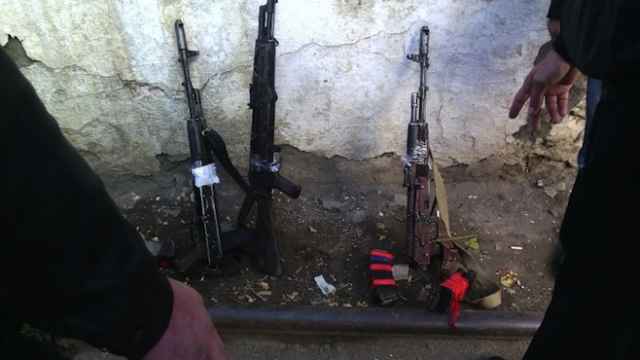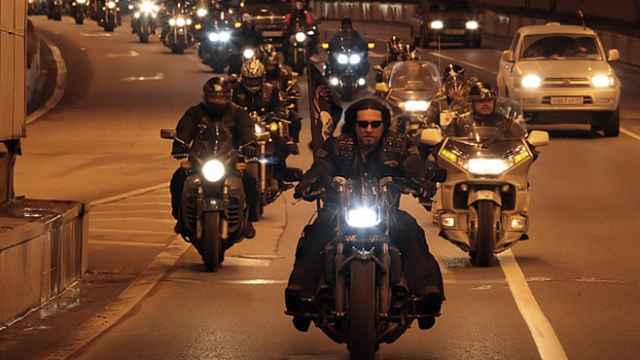Chechen leader Ramzan Kadyrov has described the Islamic militants that plague his republic as an incurable disease, in comments to the Izvestia newspaper, saying that the only way to deal with them is to destroy them.
Emphasizing that Chechen authorities have their own house in order, Kadyrov said the masterminds of a deadly Dec. 4 terrorist attack on Grozny were from neighboring Dagestan and Ingushetia, not Chechnya.
"The number [of remaining terrorists] changed, of course, after we destroyed 20 shaitans [devils]. So about 30 militants now remain. … Now we have information that those militants that got into Grozny came through the border with Ingushetia. We are checking Chechen territory, protecting it, and this process is practically never-ending. In the forests and the mountains we have our fighters working, regularly carrying out ambushes," Kadyrov said.
"But what has happened has happened. Maybe we underestimated them or became too calm, relaxed, and for us this is a big lesson. We can't relax as long as these devils are on the territory of the Caucasus," he said.
Fourteen policemen were killed in the Dec. 4 attack, along with more than a dozen of the militants. Another 36 people were injured, according to Kadyrov, who soon took to Instagram to declare that the family members of militants should be held liable for failing to stop the attack.
Reports of subsequent arson attacks on several homes of people with suspected ties to the militants thrust Kadyrov into the spotlight and pitted him against the republic's human rights activists, who themselves then suffered an arson attack on their offices in Grozny.
In comments to Izvestia, Kadyrov repeated earlier claims that the activists who came under attack had been working for the U.S. State Department and helping terrorists in order to destabilize Chechnya, saying they "should be driven out of Russia."
The outspoken leader also implied that Chechnya's neighboring republics were the real source of the Islamic insurgency in its current iteration.
"Earlier, the danger was on the side of Chechnya, but now, as it turns out, we have to look after our neighbors as well. I think that by using joint efforts with Dagestan and Ingushetia, we will be able to manage," he said.
As for what the interviewer described as the more "liberal" policies used against terrorists in Dagestan and Ingushetia, Kadyrov said such practices as rehabilitating militants could not work because "they are sick."
"They can't be cured, they can only be destroyed," Kadyrov said, noting that there was no need for violence in Chechnya today because, unlike in the 1990s, it now offers inhabitants peace and stability. Anyone who seeks violence there, he said, is simply "going against Islam, his own people and the law" and will be "severely punished" for it.
Chechen authorities are generally known for taking a harder line with militants than authorities in neighboring Dagestan, where the insurgency is estimated to be larger and much more active but authorities have tried "softer" tactics in the war on terror, such as a rehabilitation program for insurgents.
The program, which sought to return young men from the insurgency and reintegrate them into society, was thought to be relatively successful, but it was abolished when Kremlin-backed Ramazan Abdulatipov took the reins of the republic in January 2013.
Kadyrov also opened up about what many have described as his "special" relationship with President Vladimir Putin, a relationship which saw the president appear to defend Kadyrov at his recent press conference against journalists critical of Kadyrov's policies.
"If I found out that there was someone more devoted to Putin than me, I'd lose respect for myself," Kadyrov said in comments carried by Izvestia.
Contact the author at a.quinn@imedia.ru
A Message from The Moscow Times:
Dear readers,
We are facing unprecedented challenges. Russia's Prosecutor General's Office has designated The Moscow Times as an "undesirable" organization, criminalizing our work and putting our staff at risk of prosecution. This follows our earlier unjust labeling as a "foreign agent."
These actions are direct attempts to silence independent journalism in Russia. The authorities claim our work "discredits the decisions of the Russian leadership." We see things differently: we strive to provide accurate, unbiased reporting on Russia.
We, the journalists of The Moscow Times, refuse to be silenced. But to continue our work, we need your help.
Your support, no matter how small, makes a world of difference. If you can, please support us monthly starting from just $2. It's quick to set up, and every contribution makes a significant impact.
By supporting The Moscow Times, you're defending open, independent journalism in the face of repression. Thank you for standing with us.
Remind me later.





